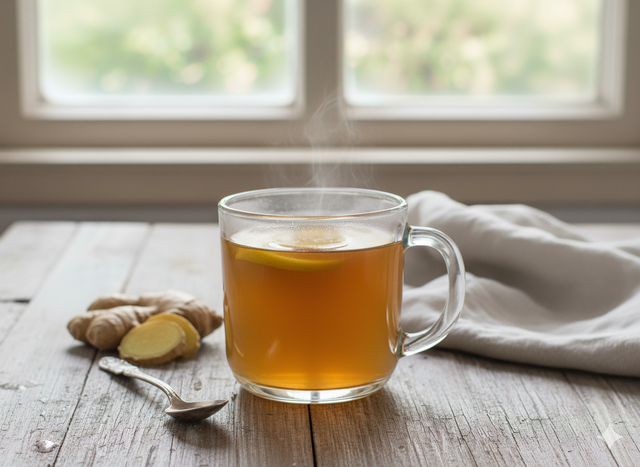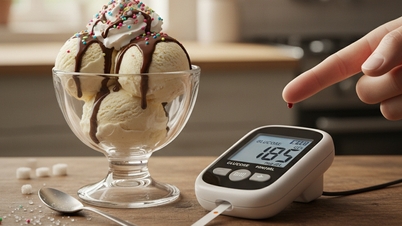Among many types of tea that are beneficial for intestinal health such as mint tea and chamomile tea, ginger tea is considered to have the best effect, according to EatingWell magazine (USA).
Reduce nausea
According to pharmacist Crystal Orozco (USA), ginger tea helps soothe nausea by blocking serotonin receptors in the gut that can trigger the vomiting response. Natural compounds in ginger, such as gingerol, will work to reduce discomfort, which can also help you feel better.
“As a nutritionist who has always had gut issues, ginger tea is one of my go-to remedies,” says pharmacist Orozco. “I always recommend a soothing cup of ginger tea with lemon and honey to soothe an upset stomach and discomfort.”

Ginger tea is especially effective in soothing digestive problems.
PHOTO: AI
Relieve indigestion
Ginger has been recognized for its therapeutic effects on gut health, especially in managing conditions such as gastroesophageal reflux disease (GERD) and indigestion. Research shows that ginger helps reduce the production of stomach acid, which can reduce the symptoms of GERD. Additionally, ginger also soothes upper abdominal cramps, bloating, and discomfort associated with indigestion.
Reduce inflammation
Chronic inflammation is a long-term inflammatory response caused by factors such as environmental toxins, lifestyle, and stress. Over time, it can damage the digestive system, which can increase the risk of conditions such as inflammatory bowel disease (IBD) or leaky gut syndrome (LGS). “The chemical compound gingerol found in ginger is a powerful antioxidant that can reduce intestinal inflammation. This helps soothe irritation and inflammation in the intestinal lining, which can prevent further damage,” says pharmacist Orozco.
If you don't like drinking ginger tea
There are many other ways to support gut health. To foster truly healthy digestion, it is important to adopt a holistic approach that incorporates a variety of good lifestyle habits. Pharmacist Orozco suggests a few other ways to support and maintain gut health.
A varied diet rich in probiotics and prebiotics : You can eat foods such as yogurt, sauerkraut and other fermented foods that contain probiotics. Garlic, onions and bananas are good sources of prebiotics. You can also combine a variety of fruits, vegetables, whole grains and lean proteins to provide fiber to support regular bowel movements, feed beneficial bacteria and help maintain a balanced microflora in the digestive system.
Drink enough water : Drinking plenty of water helps digestion and supports the balance of good bacteria in the intestines. Water also helps soften stools, making bowel movements easier. In addition, maintaining moisture in the intestinal lining helps support nutrient absorption.
Stress Management : Stress is an inevitable part of life, but consistently high levels of stress can negatively impact gut health. Over time, this can increase chronic inflammation, disrupt the balance of bacteria in the gut, and alter digestive function. Practices such as mindfulness, meditation, and regular exercise can help reduce stress and support healthy gut health.
Source: https://thanhnien.vn/loai-tra-tot-cho-suc-khoe-duong-ruot-185250925152752831.htm


![[Photo] Joy on the new Phong Chau bridge](https://vphoto.vietnam.vn/thumb/1200x675/vietnam/resource/IMAGE/2025/9/28/b00322b29c8043fbb8b6844fdd6c78ea)



![[Photo] The 4th meeting of the Inter-Parliamentary Cooperation Committee between the National Assembly of Vietnam and the State Duma of Russia](https://vphoto.vietnam.vn/thumb/1200x675/vietnam/resource/IMAGE/2025/9/28/9f9e84a38675449aa9c08b391e153183)
![[Photo] President Luong Cuong receives Chairman of the State Duma of the Russian Federation Vyacheslav Volodin](https://vphoto.vietnam.vn/thumb/1200x675/vietnam/resource/IMAGE/2025/9/29/6bd456e072504df3a468acbf9b7989c8)





















































![[Photo] President Luong Cuong receives Chairman of the State Duma of the Russian Federation Vyacheslav Volodin](https://vphoto.vietnam.vn/thumb/402x226/vietnam/resource/IMAGE/2025/9/29/6bd456e072504df3a468acbf9b7989c8)




































Comment (0)